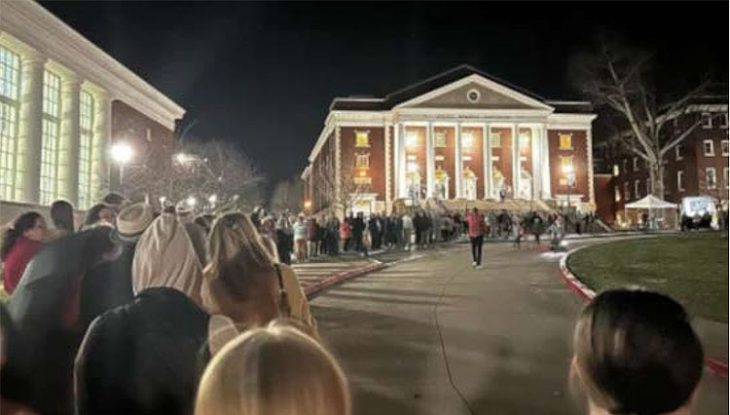One of the most common questions we get at Lamb & Lion Ministries is whether we think America will experience another nationwide revival. Our consistent answer is that we do not see how our culture would tolerate — let alone be receptive to — a major spiritual awakening. That is not to say that God could not do a mighty work. With Him “all things are possible” (Matthew 19:26).
We also see no evidence of a major revival in the End Times. If anything, we expect growing apostasy and more virulent rebellion against God. That is why Jesus asked rhetorically whether the Son of Man will find faith on the Earth when He comes again (Luke 18:8).
Still, we fully expect that the Holy Spirit will continue transforming individual lives as men and women embrace Jesus Christ as Savior and Lord. At times, gatherings of people will be convicted as the Holy Spirit moves and ministers mightily. During the Tribulation itself, many people will trust in Christ, including a great remnant of the Jewish people. The hope that lives will be impacted for eternity is what motivates us every time Lamb & Lion Ministries holds a conference or offers a series of prophetic messages.
In early February, there was a spiritual outbreak at Asbury University in Wilmore, Kentucky. Many were quick to label it a revival, reminiscent of the Great Awakening that swept the American colonies in the 18th Century and the revival that originated at Asbury in 1970. Others were quickly skeptical, dismissing this present incident as rooted in emotionalism and wishful thinking.
One of the most influential American pastors during the Great Awakening in the 1700s was Jonathan Edwards. Many people are familiar with his famous sermon entitled, “Sinners in the Hands of an Angry God.” Delivered in 1741, the title was much more dramatic than the tone in which Edwards preached. Soft-spoken but impassioned, Edwards offered a clear description of the inevitable destiny that awaits every sinner who rejects God’s free gift of salvation. His message pricked countless hearts and helped spark a revival that swept America even before its founding.
In response to criticisms about the emotional and “bodily” effects the revival was having on new converts, Edwards wrote “The Distinguishing Marks of a Work of the Spirit of God” in 1741. Based on the Apostle John’s admonition to “test the spirits to see whether they are from God” in 1 John 4, he laid out 5 marks of genuine revival:
- Jesus Christ is exalted
- The Holy Spirit prevails against the influence of Satan’s kingdom as sin and repentance is emphasized in preaching
- The Bible is exalted and held in high regard
- The Spirit of understanding and truth opposes spirits of falsehood
- Love for God and man is promoted
By all accounts that have come to me personally, those marks were present in what happened at Asbury. I say that as someone who has a personal connection to the school (one of my daughters graduated from Asbury) but who has been concerned about the drift that Asbury and many other Christian colleges have allowed in recent years. In other words, I am not inclined to jump on a bandwagon without carefully applying John’s test.
Clearly, lives were impacted for the Kingdom of God. I’ve heard from friends who testify that the Spirit of peace and unity was clearly present even as Jesus was exalted continually and reverence for the Word of God permeated everything that happened in the orderly gatherings. Although some outside voices have tried to hijack the moment for their own misguided purposes (including an effort to promote the misguided New Apostolic Reformation), university leaders within the faculty and student body were careful to maintain order that adheres to Scripture. Those inclined to self-absorbed outbursts were smothered with love but not allowed to monopolize the moment.
There is a sense in which time will tell whether lives were changed for the long haul. But that is always true. Many individuals express faith in Christ during a moment of crisis or emotionalism only to quickly fade back into an ungodly routine. Jesus spoke to this in His parable of the sower. Some seeds fall in rocky places. They immediately spring up, but quickly wither away because they lack any root (Matthew 13:3-10, 18-23).
Only God knows which seed will take root and produce much fruit. Many of us could testify that our own lives looked barren and unproductive — until a seed of Truth fell in our heart and the life-giving Living Water flowed into us. Our job is to scatter seed. Our privilege and joy is to praise the One who provided the seed and makes it grow.
Has the Gospel taken root in your heart? Are you “indeed bearing fruit… a hundredfold… sixty… [or] thirty”? (Matthew 13:23)
Let’s not scoff that some seed is wasted or some hearts are rocky or thorny. Let’s rejoice in the Sower and His perseverance to see that the seed of the Gospel is scattered. And, let’s be thankful for His patience with those of us who are endeavoring to produce fruit.







